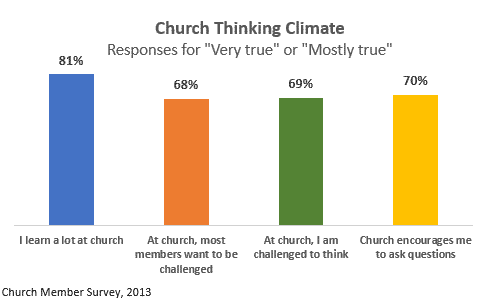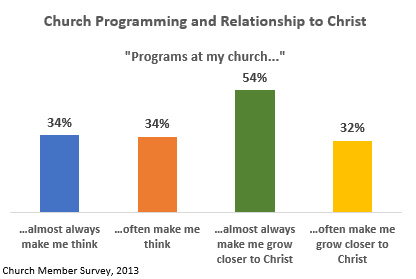A personal relationship with Jesus Christ – a relationship that is cultivated through one-on-one time with Him through Bible Study and prayer – is central to a strong faith, but there are many aspects of corporate worship and church life that also work to strengthen the individual’s commitment to God. This is due in part to the new perspectives and ideas that interaction with others can provoke; it is because of this that corporate worship and church programs are such valuable components of the Christian walk.
As described in earlier blogs, in 2013 the General Conference Office of Archives, Statistics, and Research supervised a survey of church members around the world. The study was designed to assess church members’ experiences and attitudes regarding different aspects of their spiritual lives and their participation in the Seventh-day Adventist Church. One of the areas researched was church members’ views on the thinking climate promoted in their church.
Church survey participants from the three African Divisions, the Inter-American, South American, South Asia-Pacific, and South Pacific Divisions were asked if they learn a lot at church; over half (58.3%) responded that this is very true and an additional 23% agreed that this is mostly true. In addition, the data on thinking climate shows us that:
- Over two thirds (68.3%) of members thought it is very true or mostly true that most members in their church want to be challenged to think about religious issues and ideas.
- Also, 68.6% of survey respondents indicated that it was very true or mostly true that they, themselves, are challenged to think at church.
- Over two out of three (70.4%) respondents shared that it was very true or mostly true that their church climate is one that encourages them to ask questions.

Members were also asked to what extent church programming (such as Sabbath School, Bible study classes, youth programming, outreach ministries, etc.) encourages them towards reflective thinking. When asked how often church programs make them think, around one in three (34.3%) respondents indicated that church programming almost always makes them think, while an additional third (33.6%) shared that it often makes them think. Only a tiny percentage (4.6%) stated that it never inspires their thinking.
In addition, members were asked if church programming helps them grow closer to Christ. It is encouraging to note that over half (53.9%) of survey respondents shared that church programs almost always help them grow, with nearly another third (31.8%) felt that programs often inspire this type of growth.

When this data was compared to the data from the North-American (NAD) and Trans-European (TED) Divisions, the scores on thinking climate in their churches (a category that included the statements: I learn a lot; Members want to be challenged; It challenges my thinking; It encourages me to ask questions; It expects people to learn; and It expects people to think ) are lower in both divisions, with figures ranging from 51% to 56% for all “thinking climate” responses. At the same time, a majority still considers both that church programming makes them think (68% in NAD and 62% in TED) and that the church helps them to grow closer to Christ (69% in NAD and 64% in TED).
The main goal of a walk with Jesus is to draw ever closer to Him. As this survey shows, attending corporate church services and church programs is a key part of achieving that goal. There are those who insist that they can grow to their full spiritual potential through solitude. However, the data shows us that we need to be in an environment that stimulates our thinking and challenges us to grow: local churches should aim at providing such an environment.
Now consider your own walk with Jesus. How does corporate worship and church programming fit into that relationship? If it does not have a significant beneficial influence, it may be time to make some changes. Research on young people shows that a warm and caring church and a church with high scores in thinking climate contribute a lot to mature and intrinsic faith. How would you rate the thinking climate in your local church? Does your church stimulate your spiritual growth and help you come closer to Jesus?
For more data on each division and to see our Church Member Survey Reports, click here.
Creado en colaboración con el Instituto del Ministerio de la Iglesia (Institute of Church Ministry).
Published by ASTR

